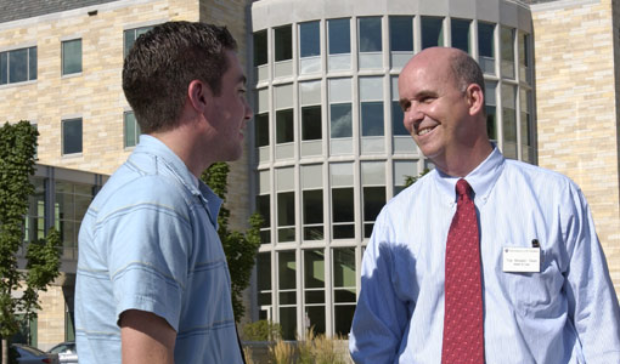The greatness of Napoleon, Caesar or Washington is only moonlight by the sun of Lincoln. … He was bigger than his country – bigger than all the Presidents together … and as a great character he will live as long as the world lives. – Leo Tolstoy, The World, New York, 1909
IN THIS ISSUE, Professor Julie Oseid lauds Abraham Lincoln’s ability to express so much with such precision. She also identifies in Lincoln’s writing habits some valuable features that might benefit all of us who aspire to be effective writers. Professor Oseid’s fine essay is part of her larger provocative research project – to explore the practices and styles of other presidents who were elegant writers.
In researching models of excellence and drawing lessons from their conduct, Professor Oseid is following a practice that lies at the core of this School of Law’s educational philosophy. As I have noted on many occasions, the law school’s principal goal is to educate the whole person and especially to assist our students in their journeys to become servant leaders. A part of our distinctive mission is to place before our students, those lawyers, judges and other professionals who have become successful and are living lives worth emulating. Our ABA award-winning Mentor Externship, our elective courses on ethical leadership, and a variety of initiatives sponsored by the Holloran Center for Ethical Leadership follow this common pattern of role-modeling.
Professor Oseid’s essay on how we might imitate Lincoln the writer reminds me also that another way to learn about authentic leadership is to read about great men and women. A good place to start, as Professor Oseid correctly notes, is with Lincoln.The challenge is to select a book or two about Lincoln from the thousands that exist. One of my favorites is Doris Kearns Goodwin’s Team of Rivals: The Political Genius of Abraham Lincoln. Goodwin’s book details Lincoln’s brilliance and, as Goodwin describes, his “profound self-confidence” in choosing a Cabinet comprised principally of his fiercest political rivals. In the 1860 Republican Party race, three men challenged Lincoln for the nomination: New York Senator William Seward, who would become Lincoln’s secretary of state, Ohio Governor Salmon Chase, whom Lincoln selected as his treasury secretary, and Missouri statesman Edward Bates, who served as attorney general.
Lincoln’s decision to surround himself with his challengers offers a number of lessons. One might begin with his genius in understanding the political benefits of keeping his party rivals close, rather than allowing them to chip away from outside. Easier said than done, however, if you have ever attempted to work day in and day out with someone who wants your job. And Lincoln was able not only to survive with this group of opponents – they became his strongest supporters. Seward became Lincoln’s closest friend and adviser. Bates came to describe Lincoln as “very near … a perfect man.” In paying close attention to voices that lesser men and women would not have allowed to speak, in assuming responsibility for the failures of his subordinates, and in sharing credit with ease, Abraham Lincoln’s presidency demonstrates that political success and ethical leadership are not antithetical. Doris Kearns Goodwin sums it up: “[Lincoln’s] success in dealing with the strong egos of the men in his Cabinet suggests that in the hands of a truly great politician the qualities we generally associate with decency and morality – kindness, sensitivity, compassion, honesty and empathy – can also be impressive political resources.”
Nor, of course, are legal success and ethical leadership antithetical. In these crisis times in which we live, we should be both comforted and inspired that good men and women can become great.
Thomas M. Mengler
Dean and Ryan Chair in Law
University of St. Thomas School of Law
Read more from St. Thomas Lawyer.





